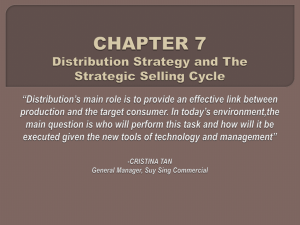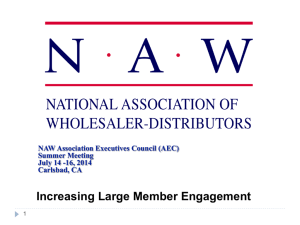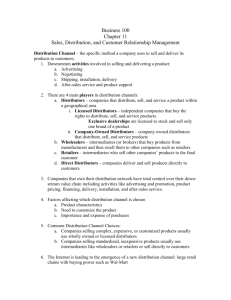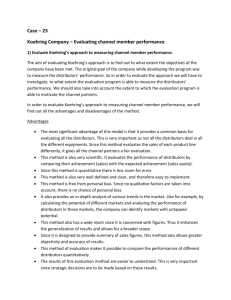The Most Common Mistakes Manufacturers Make When Dealing
advertisement
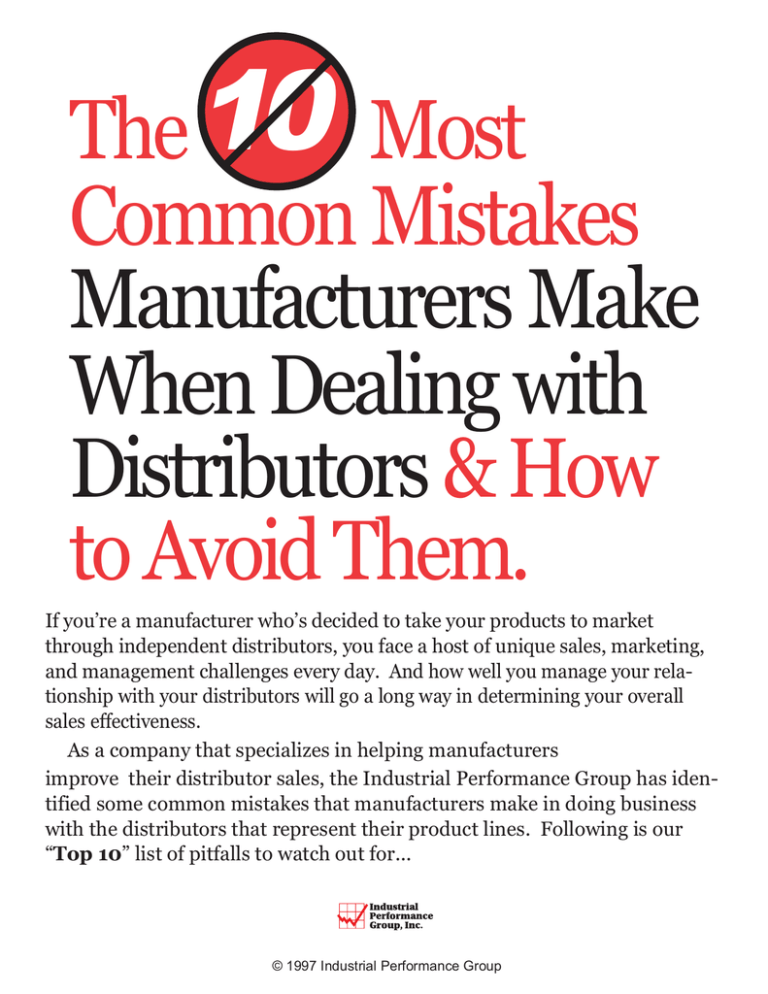
The 10 Most Common Mistakes Manufacturers Make When Dealing with Distributors & How to Avoid Them. If you’re a manufacturer who’s decided to take your products to market through independent distributors, you face a host of unique sales, marketing, and management challenges every day. And how well you manage your relationship with your distributors will go a long way in determining your overall sales effectiveness. As a company that specializes in helping manufacturers improve their distributor sales, the Industrial Performance Group has identified some common mistakes that manufacturers make in doing business with the distributors that represent their product lines. Following is our “Top 10” list of pitfalls to watch out for... © 1997 Industrial Performance Group Viewing your distributor as your customer. Not understanding the customer’s business. You may send your invoices to them, and it may be their checks that you deposit in your bank account. But that doesn’t make your distributor your customer. The real customer is the person or organization that has a need that’s best met by the function and attributes of your product. Without them, neither you nor your distributors would be in business. Therefore, you need to view your distributor not as your customer, but as your “channel partner” who is, in effect, your teammate in making sure the needs and expectations of the “true” customer are met. As such, you need to structure the relationship you maintain with your distributors in a way that will enable you to best meet the customer’s needs and expectations in a way that’s profitable for both you and your distributors. The term “value-added” is among the most popular marketing buzzwords of the decade. And many manufacturers expect their distributors to be the source of that added value for the end users of their products. Distributors frequently respond by offering their customers more and more services from which to choose. But in today’s highly competitive, fast-paced marketplace, more choices may be one of the last things that customers want. Customers want exactly what they need, when they need it. Period. Adding more services to your offering may actually make it harder for customers to do business with a distributor. Real value for customers comes from helping them reduce their overall costs and/or improving their own performance. Therefore, before you and your distributors can truly begin to add value for your mutual customers, you need to gain a clear understanding of the customers’ businesses — especially those activities that they perform as they acquire, store, use, and dispose of the products they purchase. Then you and your distributors can tailor your service offerings accordingly. 1 Failing to understand your distributor’s business. Distribution is a margin business. As such, distributors naturally gravitate toward selling those products that offer the most return on the resources — i.e., money, time, & people — that they invest. Independent distributors are just that — separate business entities that have their own goals, strategies, and operating philosophies. And when those are at cross purposes with your own, the stage is set for destructive conflict between you and your distributors. The solution to this problem lies in recognizing that distributors will act in their own best interests and tempering your expectations accordingly. Also, you need to work closely with your distributors to clearly identify what you expect of them and what they can expect from you. By carefully defining each other’s specific roles and responsibilities together, you can maximize your respective profitability by avoiding costly duplication of effort and preventing the problems that frequently arise from unreasonable expectations. 2 3 Not setting specific goals for distributor performance. There’s an old adage that says, if it doesn’t get measured it doesn’t get done. And that adage certainly applies to distributor sales performance. By the time most manufacturers notice problems with their distributor sales, it’s especially tough to do anything about them. And it’s difficult to criticize a distributor for performance that’s not up to your expectations when you haven’t told them what you expect of them in the first place. So you need to work with each and every one of your distributors to set specific and measurable sales goals for them, let them know that their performance will be evaluated throughout the year, and make sure they understand the yardstick against which they’ll be measured — leads generated, quote-to-close ratio, etc. Then monitor them closely so you can take corrective action quickly if it’s necessary. 4 © 1997 Industrial Performance Group Assuming that your distributors can sell. Anyone who has ever been involved in sales will tell you that selling is hard work. And if your product is anything more than a true commodity, the chances are good that getting the order will depend upon how well somebody does in answering a customer’s questions and overcoming objections that frequently arise during the sales process. If you’re relying solely on distributor salespeople to perform these critical tasks, you could be making a fatal error. Most distributor salespeople understand the importance of learning about a product and how to sell it. But if you take into account how many different products the average distributor carries and how much training would be required to effectively prepare them to sell all these different items, you’ll see that your distributors’ ability to effectively sell your products may be minimal at best. So you need to come to terms with this reality and augment your distributor sales efforts with other ways of getting product, sales, and technical information in the hands of prospective customers. 5 Assuming that your distributors want to sell. There’s a big distinction between selling and taking orders. And all too often, a distributor salesperson’s approach to sales is to wait for the phone to ring and ask, “How many do you need?” When it’s a customer on the line. That method may work very well for a distributor with a lot of products that tend to sell themselves. But if your product involves considerable pre-sale work or a complex sell, you need more than a bunch of order-takers. Many manufacturers invest a lot of money in training distributor salespeople about their products and how to sell them. But all the sales training in the world won’t help improve the performance of distributor salespeople who are content to merely take orders. The key is to build distributors’ commitment to your company. And you can do that by taking steps to make your products more important to the financial success of the distributor while at the same time reducing the costs and “hassles” incurred by the distributor when selling them. 6 Relying solely on discount programs and other “spiffs” to encourage distributors to sell your products. Incentive programs are a staple of many manufacturer-distributor arrangements. And a well-crafted incentive program can be instrumental in helping a manufacturer boost sales, expand its market share, and increase its leverage with its distributors. Unfortunately, many such programs are poorly designed, and result in nothing more than a lot of product gathering dust on distributors’ warehouse shelves while the distributors’ salespeople are off on a vacation trip at the expense of the manufacturer. Or the focus of the salespeople becomes the contest rather than the customer. Programs offering discounts, junkets, merchandise, and other spiffs to distributors should be structured so that they encourage distributors to continually sell your products rather than simply build their inventories when they can get a better price. Another important element of a good incentive program is to reward distributors for improving their sales proficiency. It’s also important that any incentive programs be tied directly to your company’s goals and the strategy being employed to realize those goals. And even more importantly, remember that spiffs alone aren’t enough. They have to be supported with customer-oriented marketing efforts, training programs, and other support. 7 Failing to properly manage the relationships you maintain with your distributors. Managing a distribution territory is often a key activity for manufacturers’ field sales people. Unfortunately, manufacturers’ salespeople rarely are sufficiently trained in managing distributor relationships. And when the salesperson doesn’t have the skills to manage the relationship, the relationship manages the salesperson. When that happens, the level of manufacturer-distributor conflict goes up, sales performance goes down, and salespeople spend more time patching things up with their distributors than they do in finding and keeping customers. 8 © 1997 Industrial Performance Group Therefore, to better compete in today’s highly competitive environment, salespeople who are responsible for dealing with distributors need training that covers more than just product knowledge and basic selling skills. They also need to be trained in effectively managing the manufacturerdistributor relationship. Failing to communicate with your distributors on a regular basis. Rare, indeed, is the manufacturer who doesn’t have complaints about the performance of its independent distributors. Likewise, distributors are constantly carping about the poor support they receive from the manufacturers they represent. And in those industries where competition is especially intense or opportunities for growth are declining, minor complaints can quickly escalate into destructive manufacturerdistributor conflict. The solution is simple. Talk it out. Open, honest, and ongoing communication between manufacturers, distributors, and — most importantly — customers is the key to reducing conflict and improving sales and marketing effectiveness. Communication is the “glue” that holds a distribution channel together. As independent businesses, distributors have a high degree of autonomy in their relationship with a manufacturer. Good communication is therefore critically important in ensuring that the activities you and your distributors engage in are properly aligned and focused. Communication also fosters shared values, mutual support, improved customer satisfaction, and an added incentive for your distributors to focus on your products. 9 Assuming that distributors are the best way to take your products to market. During the past 10 years, dramatic changes have occurred in the manner in which manufacturers take their products to market. The emergence of home centers, warehouse clubs, catalog houses, and other alternative channels of distribution have forever changed conditions in many industries. 10 Also, the availability of electronic commerce between manufacturers and their ultimate customers can often eliminate the need for a manufacturer to maintain outside distributors. Many manufacturers tend to base their channel management decisions on emotion rather than fact. “Our distributors have been with us through thick and thin — we couldn’t possibly think about leaving them,” is a common refrain. Nonetheless, distribution channels — like products — have life cycles of their own. A channel becomes obsolete when it is no longer capable of meeting the needs and expectations of the customers it was intended to serve. So if you’re currently being buffeted with dramatic changes in the way your industry operates and/or the way customers want to buy, it may be time to rethink the channel you’re using to market and sell your products. About the Industrial Performance Group. The Industrial Performance Group, Inc. is a company that specializes in helping manufacturers take the guesswork out of taking their products to market. Our primary focus is on helping manufacturers that rely on independent distributors for the sale and distribution of their products. Manufacturers typically use our services to help deal with such problems as lagging distributor sales, increasing manufacturerdistributor conflict, rising sales costs, unhappy customers, and/or gaps in market coverage. You’ll especially benefit from our services if you need reality-based answers to the following questions: • What can we do to improve our distributors’ sales performance? • How can we do a better job of selecting the right distributors to sell our products? • Are there better ways to take our products to market? • If so, what are the best options available to us for getting our products into the hands of our customers? ➜ 800.867.2778 www.indusperfgrp.com © 1997 Industrial Performance Group


